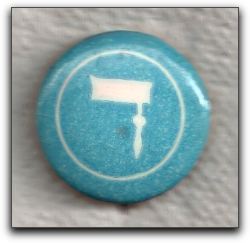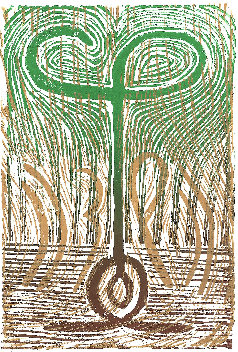As I wrote the other day, while I prepare during the month of Elul for Rosh haShannah, I think about what is peripheral to my life, and what I should toss.
Aside from blowing shofar each day during Elul, another practice has taken on the nature of a daily ritual: the reading of Psalm 27.

Psalm 27
According to Rabbi Benjamin J. Segal president of Melitz, the Center for Zionist Jewish Education, Jerusalem, “This practice is relatively new, evidently some 200 years old. But it is a wise practice, even essential.”
I find it interesting to note that a wise, “even essential” practice of reading a more than 2000 year old text, could be only 200 years old. Why is it that it was non-essential for so long?
Perhaps the most common set of phrases from the Psalm is verse 4:
One thing I ask of Adonai,
only that do I seek;
to live in the house of Adonai
all the days of my life,
to gaze upon the beauty of Adonai,
to be in God’s sanctuary.
[audio:http://www.davka.org/wp-content/uploads/2009/08/achatshaalti.mp3]
I learned the melody I sing here from Rabbis Tamar Malino and Elizabeth Goldstein. The other night, Erev Shabbat (second day of R“H Elul 5769) I heard a completely different melody. If you know who wrote the melody I sing, or can share with me others, please do.
What can it mean (to paraphrase): “to live in God’s house and gaze on God’s beauty continuously?”
R. Segal goes on to explicate the Psalm a bit more stating that the Psalmist struggles to recognize that what may seem to be a life living in two different worlds is actually one.
perhaps we can unify our lives.
The folk tale adapted from a version in The Dybbuk by S. An-Sky tells us: “Every spot where a we raise our eyes to heaven is a holy of holies.”
If we function according to its teaching we will know that our simple corner is inextricably linked to every other spot in the cosmos.
We know that we struggle to unify ourselves. We can live in the paradox of the awareness that those things that seem peripheral are so, and, at the same time essential. We can Think Globally as we Act Locally (on any scale). Or, perhaps, we could rephrase it to say that we “think holy, as we act profane” continuously raising up sparks.
As my colleague R. Phil Posner has reminded us…
In this spring’s CCAR Journal The Reform Jewish Quarterly, our colleague Margaret Wenig shares a terrific article on “The Poetry and Power of Paradox”. At the end she quotes Dr. Joel Hoffman who points out that in the Un’tane tokef it says, “it is written” and not “God writes” because We write down who shall live by water and fire, etc. Let us be clear, Hoffman concludes, as the richest nation in the world, we let children die in Africa, we have written them in the book of death, not God.
We may live in God’s house continuously, but the house is in constant need of repair.
“I the tree, you the trimmer.” Or in the words of R. Jack Reimer which have made their way into the Gates of Repentance:
“Now is the time for turning.”
This is the time of turning. In my post for R“H Elul on August 20, 2009, I used a metaphor from the automobile industry. Today, gardening.
Since the time of the first garden, we humans have been designated as Ziony Zevit at the American Jewish University describes us “agriculturalists-in-residence”. Soon we will finish harvesting our gardens. The time will then come for us to turn over the soil as the new year ahead progresses.
Not only with our gardens, so also with us. The time has come to turn over, but more than a new leaf or a little soil. Or perhaps we should turn around, but not in the manner of our puppies that chase their tails running around in circles as they distract us in our garden. Nor in the manner of the snakes in our garden, the Ouroboros the snake with its tail in its mouth, forming a never ending circle. No, I cannot simply toss off a bit of old skin as the snake simply loses its, but remain essentially the same.
We need to reach farther than the beauty that is skin-deep. Sometimes the pipes that lay beneath our gardens develop cracks. Roots and detritus find their way in and clog the flow of irrigating waters. There are times when it becomes so serious that we need to call for help and the company comes that snakes through the piping, routing out the accumulated debris. So it is with us. We need to reach into our hearts and turn them, cleanse our thickening arteries, open them to freshness, enable them to flow freely with the fluids that bring fresh life.
And thus, we will have re-turned to ourselves [Song of Songs 4:16].
Awake, o north-wind; and come, thou south;
Blow upon our garden that the spices thereof may flow out.
Let these simple humans come into their garden and eat of its precious fruits.
For those who want downloads of Psalm 27 you can print or reformat and use for yourself (or in some other setting), here is the text in English and Hebrew both in PDF as well as RTF formats.
dalet ד for verse 4 on the forth of elul
I have a number of lapel buttons that display no more than a Hebrew letter. At one time the Union of Orthodox Congregations created a series of buttons letters with the 22 letters as they appear in Torah script. I have a faint recollection this was done to support a project of congregations sponsoring the writing of Torah scrolls. (“Buy a letter in the Torah.”?)
This button dates from the early 1950s or mid 1940s. I have no documentation on it, nor any explanation as to why it was produced and distributed.

dalet
| Date: | 1940s? |
| Size: | 2.1 |
| Pin Form: | straight |
| Print Method: | celluloid |
| Text | ד |

